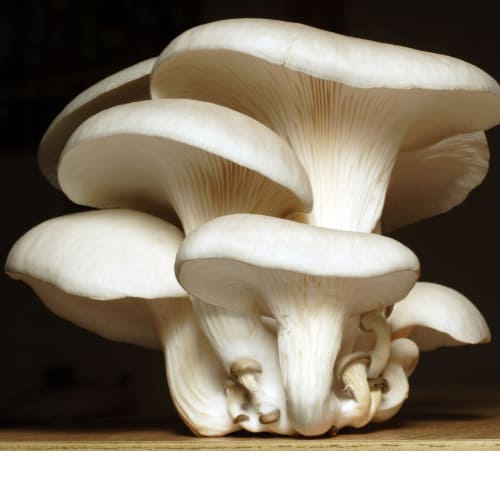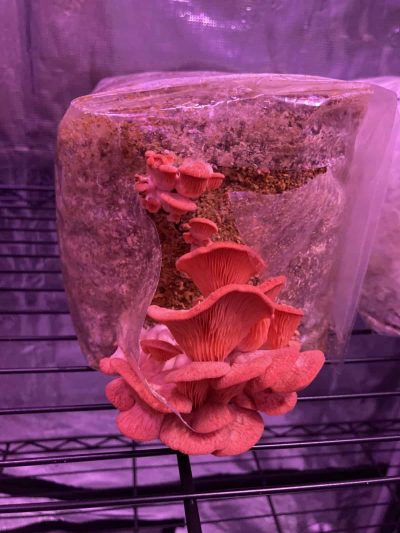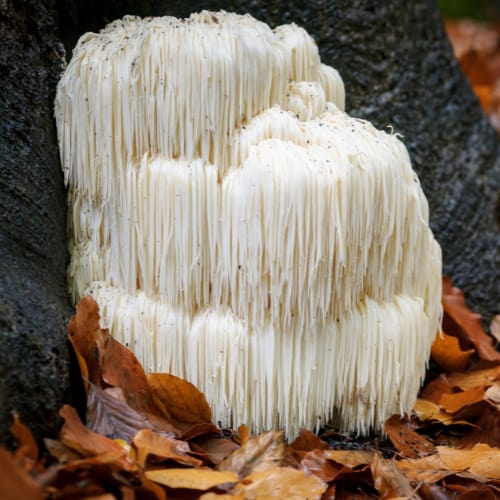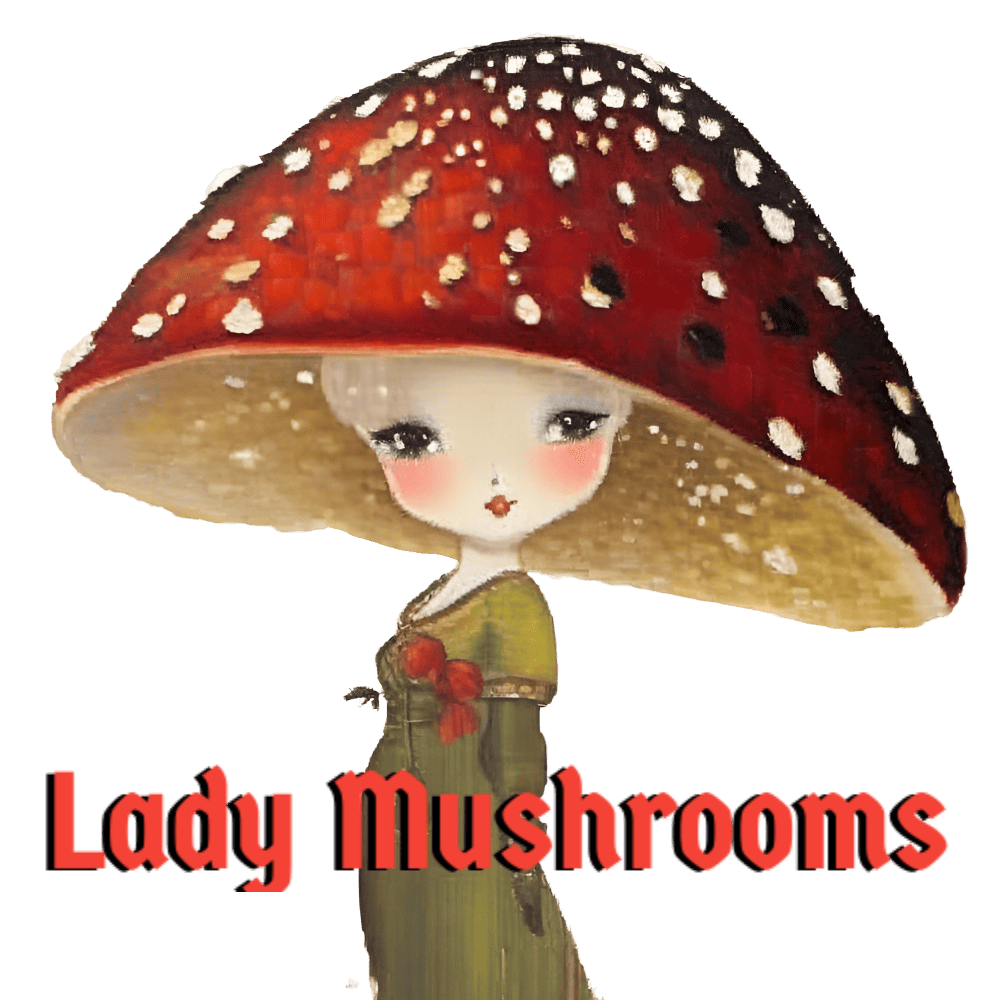Our Mushrooms

Lady Mushrooms Varieties
Lady Mushrooms presents a delightful range of organic mushrooms, each picked at its peak to deliver unparalleled taste and quality.

Facts About Oyster Mushrooms:
– Oyster mushrooms belong to the Pleurotus genus.
– They are named after their resemblance to oysters in both color and shape.
– Oyster mushrooms can be found in various colors, including white, gray, yellow, and pink.
– These mushrooms are highly sought after for their delicate, mild flavor and tender texture.
– Oyster mushrooms are a popular choice for culinary dishes and are used in various cuisines worldwide.
– They are rich in nutrients such as protein, fiber, B vitamins, and minerals like iron and potassium.
– Oyster mushrooms are known for their potential health benefits, including immune system support and cholesterol regulation.
– These mushrooms are often cultivated on a variety of substrates, including straw, wood chips, and agricultural waste.
– They are efficient decomposers, aiding in the breakdown of organic matter in ecosystems.
– Oyster mushrooms have a short growth cycle, often maturing within a few weeks.

Oyster Mushrooms (Pink, Brown, and White Varieties)
Oyster Mushrooms are renowned for their unique taste, meaty texture, and adaptability in various culinary dishes. With shades ranging from vibrant pink to earthy brown and classic white, these mushrooms add visual appeal to any meal.
Flavor Profile: Oyster mushrooms have a mild and delicate flavor with subtle woodsy undertones. This makes them an excellent choice for gourmet dishes, as they can complement and enhance other ingredients without overpowering them.
Nutritional Benefits: These mushrooms are not only tasty but also packed with essential nutrients. They are low in calories and provide a good source of protein, fiber, vitamins (including B vitamins), and minerals like iron and zinc. Known to boost the immune system, Oyster Mushrooms are a healthful addition to any diet.
Oyster Mushrooms: Culinary Delights and Nutritional Powerhouses
Oyster mushrooms, scientifically classified under the Pleurotus genus, are fungi that bear a resemblance to oysters, both in color and shape, hence their intriguing name. Found in a spectrum of colors such as white, gray, yellow, and pink, oyster mushrooms are cherished not only for their distinctive appearance but also for their culinary and nutritional value.
These mushrooms are a sought-after delicacy in the culinary world, prized for their tender texture and delicate, mild flavor. Their versatility in various dishes and cuisines worldwide has earned them a special place in gastronomy. Beyond their palatability, oyster mushrooms boast a remarkable nutritional profile. They serve as a good source of protein, dietary fiber, B vitamins, and essential minerals like iron and potassium.
One of the notable features of oyster mushrooms is their potential health benefits. They have been investigated for their positive effects on the immune system, attributed to bioactive compounds they contain. Additionally, some studies suggest that consuming oyster mushrooms may contribute to cholesterol management due to certain compounds that can help regulate lipid levels in the body.
Cultivating oyster mushrooms is a practice embraced by both home gardeners and commercial producers. These fungi can be cultivated on a variety of substrates, such as straw, wood chips, and agricultural byproducts, making them an eco-friendly option. Beyond their culinary and nutritional contributions, oyster mushrooms play a vital role in ecosystems as efficient decomposers. They aid in breaking down organic matter, contributing to nutrient cycling and the overall health of the environment.
The growth cycle of oyster mushrooms is relatively short, often maturing within a few weeks under suitable conditions. This characteristic makes them an appealing option for cultivation, providing a relatively swift harvest compared to some other mushroom varieties. Whether relished for their culinary excellence or appreciated for their ecological significance, oyster mushrooms continue to captivate enthusiasts around the world.
Lion’s Mane Mushroom
Lion’s Mane Mushroom, named for its unique appearance resembling a lion’s mane, is a culinary delight with both gourmet flavor and medicinal qualities.
Flavor Profile: Lion’s Mane has a unique flavor often likened to seafood, particularly lobster or crab. Its meaty texture and delicate taste make it a favored choice among chefs and food enthusiasts alike.
Nutritional Benefits: Beyond its culinary attributes, Lion’s Mane is revered for its health benefits. Rich in antioxidants, it supports brain health and cognitive function. Additionally, it provides essential nutrients like vitamins and minerals, including selenium, zinc, and vitamin B complex. Lion’s Mane is also known to boost the immune system and reduce inflammation, making it a truly extraordinary ingredient both in taste and wellness.
Whether you’re looking to elevate your culinary experience or enrich your diet with health-boosting nutrients, Lady Mushrooms’ Oyster and Lion’s Mane varieties offer an exceptional choice. Feel free to let me know if you need more information or have any specific requests!
Lion’s Mane Mushrooms: Unveiling Neurological Potential
Lion’s Mane mushrooms (Hericium erinaceus) are nature’s unique creation, resembling the majestic mane of a lion and harboring potential neurological wonders. These fungi are becoming increasingly recognized for their potential cognitive benefits, captivating the interest of researchers and enthusiasts alike.
Lion’s Mane mushrooms have made their mark in traditional medicine, particularly in various Asian cultures, where they have been used for centuries due to their perceived medicinal properties. Recent scientific studies have shed light on the potential neurological advantages of these mushrooms. It’s suggested that compounds like erinacines and hericenones present in Lion’s Mane may play a role in supporting brain health and function. Some research has shown promising results in terms of enhancing cognitive abilities and even potentially aiding nerve regeneration.
Apart from their potential cognitive benefits, Lion’s Mane mushrooms exhibit other bioactive properties that make them intriguing. These fungi are known to contain compounds with anti-inflammatory and antioxidant properties, which could have broader implications for overall health and wellness.
Culinary enthusiasts also appreciate Lion’s Mane mushrooms for their unique flavor and texture. When cooked, these mushrooms have a seafood-like taste, adding a delightful twist to various dishes. They can be enjoyed fresh, dried, or even as an ingredient in teas and dietary supplements.
Although not as widely cultivated as some other mushroom varieties, Lion’s Mane mushrooms are gaining momentum due to their growing popularity. Efforts are being made to make these fungi more accessible, both for culinary experimentation and potential health benefits. As research continues to unravel the mysteries behind these impressive mushrooms, Lion’s Mane stands as a symbol of nature’s capacity to offer both gastronomic pleasure and potential neurological support.

Facts About Lion’s Mane Mushrooms:
- Lion’s Mane mushrooms, scientific name Hericium erinaceus, are known for their distinctive appearance resembling a lion’s mane.
- They are renowned for potential cognitive and neurological benefits, with some studies suggesting they may support brain health.
- Lion’s Mane mushrooms are valued in traditional medicine, particularly in Asian cultures, for their potential medicinal properties.
- These mushrooms are edible and have a seafood-like flavor and texture when cooked.
- They contain bioactive compounds like erinacines and hericenones that are believed to contribute to their potential health effects.
- Research indicates that Lion’s Mane mushrooms may have anti-inflammatory and antioxidant properties.
- The mushrooms can be consumed fresh, dried, in supplements, or used as an ingredient in teas and various culinary dishes.
- While not as widely cultivated as some other mushrooms, efforts are being made to increase their availability due to growing interest.




